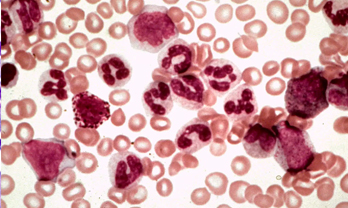Our Services

Chronic Myeloproliferative Disorders (CMPDs)
Chronic Myeloproliferative Disorders (CMPDs) are a group of rare blood cancers in which the bone marrow makes too many red blood cells, white blood cells, or platelets. These disorders develop slowly and may lead to complications such as blood clots, bleeding, or progression to acute leukemia if left untreated. Common CMPDs include Polycythemia Vera, Essential Thrombocythemia, and Myelofibrosis.
Symptoms may include:
Causes may include:
Treatments
Treatment focuses on controlling symptoms, preventing complications, and slowing disease progression, and may include:
Prevention
CMPDs cannot always be prevented as many are genetic, but complications can be reduced by:
